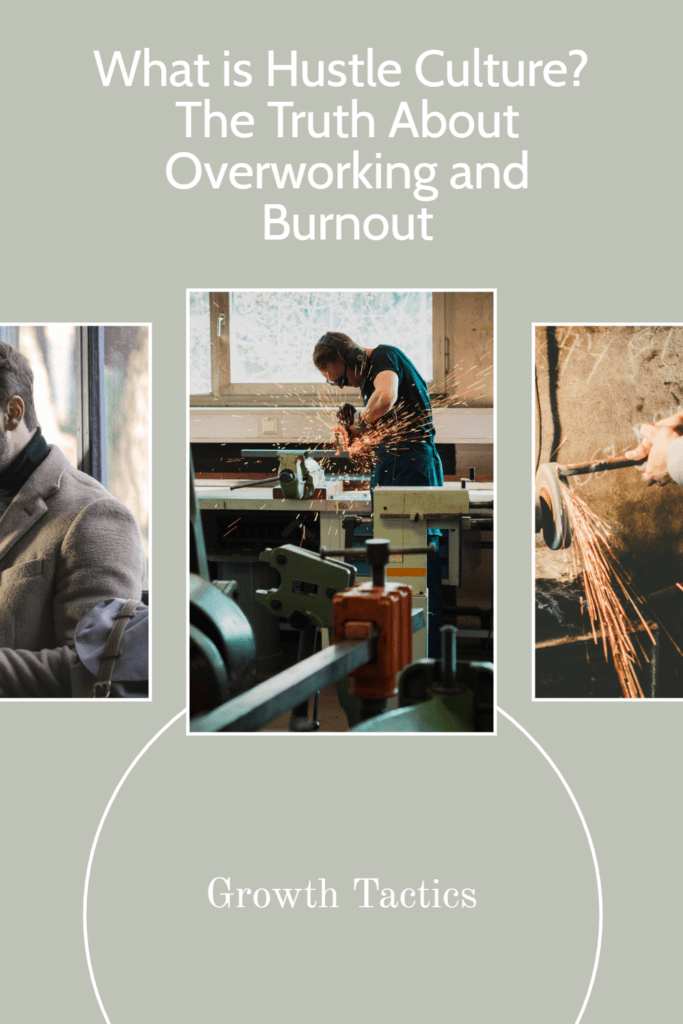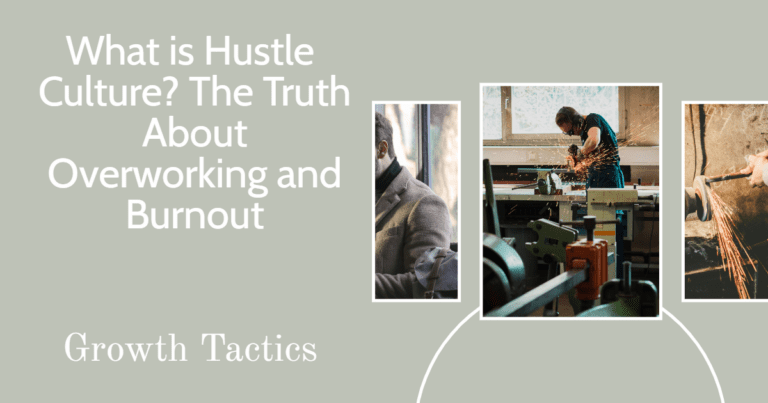Hustle culture is a trend that has grown over the years. Social media stars, influencers, entrepreneurs, and business leaders often show off their busy lives, constantly posting about their long work hours. It can make you feel like you’re not doing enough.
But here’s the truth: success looks different for everyone. What works for one person might not work for you. And that’s okay.
I’ve learned that pushing yourself too hard can hurt your health and happiness. It’s important to find your own balance.
In this article, we’ll explore the concept of hustle culture, the dangers of overworking and burnout, and the importance of work-life balance.
Jump To Section
What is hustle culture?
It’s a way of thinking that prioritizes work over everything else. Some people believe working long hours nonstop is the only path to success, but is that really true?
I’ve seen firsthand how this mindset can hurt people. It pushes them to ignore their health, families, and hobbies. That’s not a balanced life.
Remember, you’re more than your job. Your worth isn’t tied to how many hours you work. It’s about finding your own path and purpose.
Social media often shows only the glamorous side of hard work. But real success looks different for everyone. What matters is what success means to you.
The dangers of overworking
Overworking can have serious negative effects on both mental health and physical well-being. When people prioritize their careers over their personal lives, they often experience chronic stress, anxiety, and exhaustion. This can lead to burnout, a state of emotional, physical, and mental exhaustion caused by prolonged exposure to stress.
Symptoms of burnout include fatigue, insomnia, irritability, anxiety, and depression. Burnout can also lead to physical symptoms such as headaches, stomachaches, and muscle pain.
Personal anecdotes and case studies can help illustrate the impact of overworking and burnout. For example, a study conducted by the World Health Organization found that burnout was associated with a higher risk of depression, anxiety, and alcohol abuse.
Additionally, personal stories of individuals who have experienced burnout can provide insight into the toll that overworking can take on one’s mental and physical health.
It’s important to recognize the dangers of overworking and prioritize self-care and work-life balance to avoid burnout. This can include setting boundaries around work hours, taking regular breaks and vacations, and engaging in activities outside of work that bring joy and relaxation.
The myth of “toxic productivity”
Toxic productivity is the belief that one must constantly be productive to the point of exhaustion, even when it is not necessary or healthy. It is closely related to hustle culture, which emphasizes overworking and sacrificing self-care in the pursuit of professional success.
The pressure to constantly be productive and work harder can lead to feelings of guilt and shame when taking breaks or resting. Many people believe that taking time to rest or engage in non-work related activities is unproductive or even lazy. This can lead to a cycle of overworking, burnout, and guilt for not working hard enough.
Toxic productivity can also lead to a lack of work-life balance and negatively impact personal relationships and mental health. It is important to recognize the value of rest and self-care and prioritize them as much as professional goals.
It’s essential to establish healthy boundaries and prioritize self-care to avoid toxic productivity. This can include setting realistic work goals, taking breaks throughout the day, and engaging in hobbies or activities that bring joy and relaxation. It’s important to remember that taking breaks and prioritizing self-care is not a sign of laziness, but rather a necessary component of maintaining mental and physical well-being.
The impact of technology and social media on our work habits
Technology and social media have revolutionized the way we work and communicate, making it easier than ever to stay connected and productive. However, they also come with a downside. The pressure to be constantly available and productive can lead to burnout and a lack of work-life balance.
The constant notifications, emails, and messages can make it difficult to disconnect from work and prioritize personal time. The fear of missing out or falling behind can also lead to a constant need to check and respond to messages, even during personal time. This can lead to a lack of rest and relaxation, and ultimately lead to burnout.
To use technology in a way that promotes work-life balance, it’s important to establish healthy boundaries around its use. This can involve setting specific times to check and respond to messages and emails and turning off notifications outside of work hours. It can also mean using tools and apps that help manage and prioritize work tasks, allowing individuals to work more efficiently and reducing the need to work outside of designated work hours.
Additionally, individuals can use technology to promote self-care and relaxation. This can involve using mindfulness apps or podcasts, listening to calming music, or engaging in virtual fitness classes or meditation sessions. By using technology in a way that promotes relaxation and well-being, individuals can reduce stress and improve their overall work-life balance.
It’s also important to recognize that social media can have a negative impact on work-life balance, as well. The constant need to check notifications and stay up-to-date on social media can distract from personal time and lead to a lack of focus and productivity during work hours. By limiting social media use and setting boundaries around its use, individuals can reduce distractions and improve their ability to focus on work tasks.
The importance of work-life balance
Work-life balance is the concept of maintaining a healthy balance between work and personal life. It involves prioritizing personal time and activities outside of work to ensure that work does not consume all of one’s time and energy. Work-life balance is essential in preventing burnout.
Achieving work-life balance can lead to numerous benefits, such as improved mental and physical health, lower stress levels, increased job satisfaction and productivity, and better personal relationships. Having time to engage in hobbies, spend time with loved ones, and engage in self-care activities can help reduce stress, anxiety, and burnout.
Avoiding burnout is another important aspect of work-life balance. Signs of burnout include chronic stress, exhaustion, and a lack of motivation. To avoid burnout, it’s essential to prioritize self-care and engage in activities outside of work that bring joy and relaxation. This can include exercise, mindfulness practices, and hobbies. It’s also important to establish healthy boundaries around work and prioritize rest and relaxation.
Tips for achieving a work-life balance
Setting boundaries around work hours is an essential strategy for achieving work-life balance. This can involve establishing clear start and end times for work, as well as setting expectations with colleagues and managers around communication outside of work hours.
It can also mean limiting the amount of time spent on work-related tasks during personal time, such as not checking emails or taking work calls during designated personal time. By setting these boundaries, individuals can create a clear separation between work and personal life, allowing for greater balance and reducing the risk of burnout.
Prioritizing personal time is also crucial for achieving a work-life balance. This can involve scheduling regular activities that bring joy and relaxation, such as exercise, hobbies, or spending time with loved ones. It’s important to make time for these activities and not let work take priority over them. By prioritizing personal time, individuals can recharge and rejuvenate, leading to greater productivity and overall well-being.
Establishing a routine that allows for a healthy balance between work and personal life is another effective strategy. This can involve scheduling regular breaks throughout the day to engage in activities that promote relaxation and mental clarity, such as taking a walk or practicing mindfulness exercises.
It can also mean taking time off when needed, such as scheduling vacations or personal days to recharge and refocus. By establishing a routine that prioritizes self-care and relaxation, individuals can maintain a healthy balance between work and personal life, reducing the risk of burnout and promoting overall well-being.
Conclusion
Hustle culture and overworking can have serious negative impacts on our mental and physical health, relationships, and overall well-being.
Toxic productivity can lead to burnout, exhaustion, and a lack of work-life balance. It can also negatively impact our personal relationships and mental health. Prioritizing productivity and success over our own well-being can result in dangerous and unsustainable work habits that can ultimately harm us in the long run.
It’s essential to prioritize our mental health and well-being over productivity and success. We must recognize the value of rest and self-care and prioritize them as much as our professional goals. We should set realistic work goals, take breaks throughout the day, and engage in hobbies or activities that bring joy and relaxation.
It’s important to remember that taking breaks and prioritizing self-care is not a sign of laziness, but rather a necessary component of maintaining mental and physical well-being. We must establish healthy boundaries and prioritize self-care to avoid toxic productivity and achieve a healthy work-life balance.
So, let’s take a step back and prioritize our own well-being over productivity and success. Let’s remember that we are human beings, not just productivity machines. By prioritizing our mental health and well-being, we can lead more fulfilling and healthier lives both inside and outside of work.
Did you enjoy this article on hustle culture and burnout? Please share and subscribe below.


